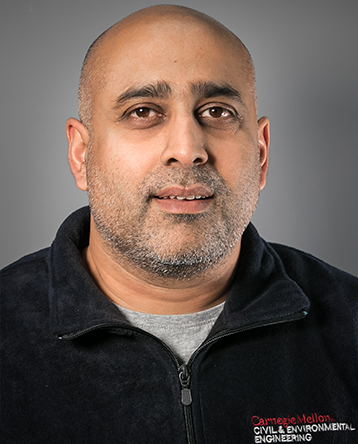Kaushik Dayal
Walter J. Blenko, Sr. Professor, Civil and Environmental Engineering
Courtesy Appointment, Mechanical Engineering, Materials Science and Engineering
Walter J. Blenko, Sr. Professor, Civil and Environmental Engineering
Courtesy Appointment, Mechanical Engineering, Materials Science and Engineering

Kaushik Dayal is a professor in the Department of Civil and Environmental Engineering at Carnegie Mellon University. Dayal's research interests are in the area of theoretical and computational multiscale methods applied to problems in materials science, with particular focus on bridging from atomic to continuum scales in the context of functional behavior, non-equilibrium response, and electromagnetic effects.
Dayal received his B.Tech. degree from the Indian Institute of Technology Madras (Chennai) in 2000. He earned his M.S. and Ph.D. in Mechanical Engineering at the California Institute of Technology in 2007.
2007 Ph.D., Mechanical Engineering, California Institute of Technology
2001 MS, Aeronautics, California Institute of Technology
2000 B.Tech., Naval Architecture, Indian Institute of Technology Madras
PITA
Advancing microreactor technology efficiencies through digital twins
Civil and Environmental Engineering
The College of Engineering announced eight new endowed chairs. Four are professors in the Department of Civil and Environmental Engineering.
CMU Engineering
The Department of Defense awards a team of researchers funding to develop energy-absorbing, structure-preserving materials that are more resilient under extreme loads.
Civil and Environmental Engineering
Kaushik Dayal, a professor of civil and environmental engineering at Carnegie Mellon University, will lead a team of researchers looking at the behavior of heterogeneous materials through the Department of Defense's Multidisciplinary University Research Initiative (MURI) program. The project aims to improve the resilience of defense-related materials under extreme conditions of stress and uncertainty.
The Data-driven Discovery of Optimized Multifunctional Material Systems has announced two new projects made possible with support from the Air Force Research Laboratory. Both will focus on how machine learning can contribute to the development of functional soft materials. CEE’s Kaushik Dayal and MechE’s Carmel Majidi will collaborate on one of the projects, while ChemE’s Gabe Gomes will work on the other.
Civil and Environmental Engineering
PhD candidate Hatice Gökçen Güner was recently awarded the 2023 Fellowship in Digital Health Innovation from the Center for Machine Learning and Health (CMLH) at the School of Computer Science. Advised by Professors Kaushik Dayal (CEE) and Alexandra Ion (SCS/HCII), Güner’s research focuses on optimizing soft material designs to achieve desired mechanical behaviors for applications in soft robots and energy-absorbing prosthetics.
Civil and Environmental Engineering
Naghibzadeh’s research focuses on multi-scale mathematical and computational modeling of the growth and evolution of materials. The phenomena of interest are electrode-electrolyte interface evolution in electrochemical devices, material accretion in additive manufacturing, microstructure evolution in polycrystalline materials, and solidification of water in glaciers.
CMU Engineering
Researchers at Carnegie Mellon University have developed a new microscopy technique that maps material microstructure in three dimensions; results demonstrate that the conventional method for predicting materials’ properties under high temperature is ineffective.
Civil and Environmental Engineering
The Ph.D. student will work on interdisciplinary projects that relate back to environmental research.
Civil and Environmental Engineering
The groups’ research could have long-term impacts in treating viruses including COVID-19. By understanding the ways that a virus can invade a cell, researchers can work to close that entry point and help individuals to avoid infection.
CMU Engineering
The Department of Defense helps fund the science behind composites used in aviation.